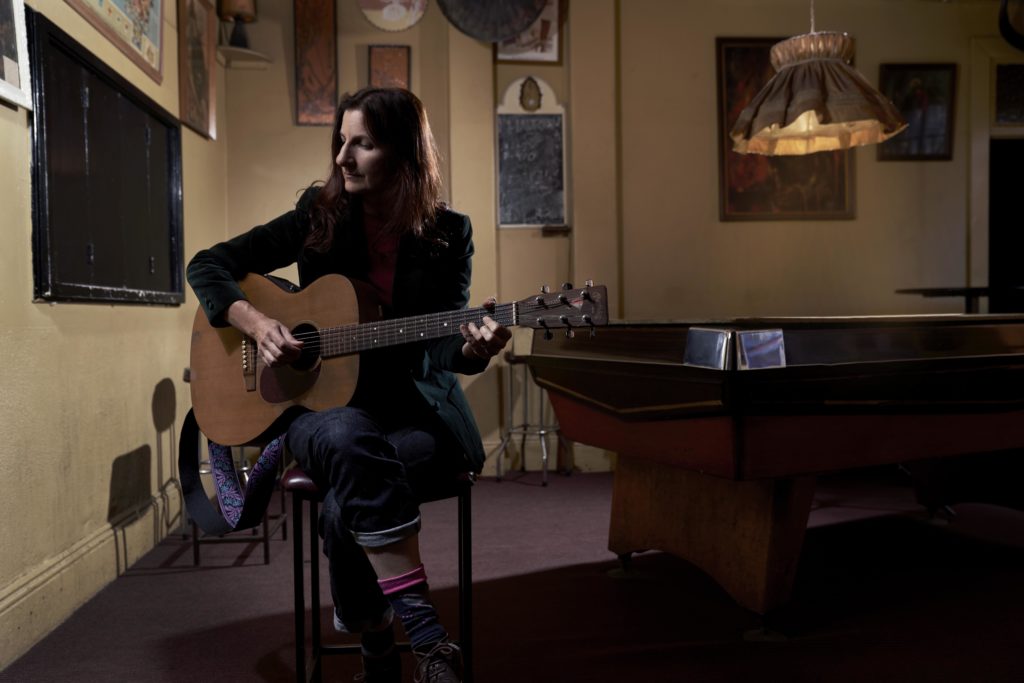
Jodi Phillis – a woman that has bared her soul and produced an honest, heart-wrenching album that unflinchingly tackles topics like loss, love, grief, menopause and hope. A transformative album. An adult album. And YMR was lucky enough to meet with Phillis to have a frank conversation about her life, inspirations, insights and muse.
As she says, “I am on a mission to speak my truth“.
Jodi Phillis is not really a household name, but many people would know her as the co-frontwoman of 90’s band The Clouds. Watch Rage at some late hour, and it is guaranteed that you might see the ‘Hieronymus’ video clip from 1991. What people might not know is that Phillis has produced five solo albums, and her most recent Becoming, is born from loss and grief, but still rejoices love, life and possibilities. Phillis is a singer-songwriter in top form and Becoming is an album that deserves to be experienced.
The night before I meet Jodi, a friend and I attend her album launch at the Kastoria Club in the Melbourne suburb of North Coburg. It seems like a long trip in an Uber trawling in the darkness venturing through the northern suburbs of Melbourne. The venue is a regional Greek club, where on Friday night the upstairs room is used for bands. The venue works. Cosy, red tablecloths, tables and chairs, vintage furniture, low lighting, posters of Greek villages and Mythos beer. Jodi takes the stage wearing a black dress, trademark cowgirl boots, and long hair. Playing her acoustic guitar and singing her stories to an audience which seems captivated. She plays the whole album in track list order but forgets to play track ten, ‘Sunshine’. It was a special night. Leaving the gig I marvelled at Phillis’ honesty as she talked about the songs, and how her life was torn asunder with loss and grief, and how she tackled the fallout of this to renew herself. Becoming being the yin and yang of Phillis’ heart.
I meet Jodi the next day on a sunny Melbourne morning. We begin the conversation in earnest, and despite the sound of coffee machines and breakfast hubbub, we delve into the two vital protagonists of the first half of the album – her mother and father.
<BP> Do you think there is an incubation period before you start writing about loss?
<JP> Yeah. I really can’t remember how long, but everyone will be different. After losing my mother, it took me about six months to a year to start writing about it.
Did you lose your mother first?
She was diagnosed with pancreatic cancer after a year I started writing the songs for this album. And then eleven months later she died. And she was only 70 – she was a young 70. It was really out of the blue, a real shock. And she was a special person – my best friend – me, my sister and my mother – we were a triangle, a soul. We were just part of each other. So, for me it just completely fucked me up for quite a long time.
Does loss change you as a person?
I am not the same person. I am really not the same person. I felt like I had to deconstruct everything in my life. I felt like it was this tsunami pushing me to total destruction to see if I could look after myself without help from anyone, because she was the one. So, it was really a destructive thing but more leaning to a transformation, and feeling like a stronger and more real person. It’s really interesting. That was my experience and I know it is different for everyone.
It really was full on. So, after a year that she died – probably really only six months after – we discovered that Dad was also dying of cancer but over in Brazil. So that was this whole complicated thing, where we kind of had to rescue him from afar through translating with this Portuguese speaking family in a village, who were nursing him. It’s a very long, very long story!
Did you bring him to Australia?
We ended up paying a nurse to escort him to New York – that’s where he had been living for twenty years – into the hospital that were managing his prostate cancer. It was all under control for so many years, but when he went to Brazil that last time, it just took over his body.
I met him there, got things organised and moved him into a hospice, and went back again to see him before he died. So, for a few years it was just shit! <laughs>
I think it was Miriam Margolyes that said, “nobody tells you that old age is going to be shitty…it’s a kind of conspiracy”!
I know! And you wouldn’t believe it as a young person anyway, because you have this veil of not comprehending that stuff – to protect yourself, I guess!
In “Mama Told Me a Secret” you have that real cute segue, where the song transforms into “Love is A Funny Game” – almost transforming into a different time.
That’s my Mother and her two sisters.
So, your Mother was a singer?
Yeah! So, they were a Jewish family from New York who moved to California when my Mother was two. And when you move to California you get into show business! My Grandparents kind of got them into a singing trio, and they were called ‘The Starr Sisters’. And they started performing when my Mother was 6 or 7 – they would tap dance, sing in harmony, the whole bit! And they kept doing that right through until my Mother was 21. They didn’t really get much schooling because they were just touring. They would tour with Tommy Steele, Sammy Davis Jr. – those kind of sixties acts. And they came out to Australia and performed on the TV show In Melbourne Tonight. And that is where my Dad fell in love with my Mother, because he was the cameraman on that show!
That show was with Graham Kennedy?
Yes, at that time. And then he went on to become a cameraman on Bert Newton’s show and other various things.
Was your Dad Melbourne based?
He was from Melbourne. I was born in Melbourne. And then when I was a baby, he got a job in Hollywood. He became a cameraman at CBS, and he worked on shows like the Dean Martin show, the Frank Sinatra show, the Barbra Streisand and Judy Garland show, the Andy Griffiths show, Jonathan Winters, Jackie Gleeson – it was incredible!
And did you meet all these amazing people?
Yeah! I even remember meeting Dick van Dyke! We lived there (in Hollywood) until I was 6, and then he got a job directing Number 96 [a raunchy Australian soap opera that included frontal nudity and tackled controversial taboo topics of the day, including gay relationships], which was why we came back to Australia. And we moved to Sydney. And then he did the Mike Walsh Show and then everything kind of combusted. I think he probably had bi-polar. Undiagnosed. So, he just couldn’t deal with people – fitting in was something he was never good at! He just burnt all these bridges. He went to America and wrote scripts for the next twenty years. Like really great Hollywood scripts. So, we have this bulk of treasure of these scripts – namely adaptations – and they are amazing, really cinematic. Old school Hollywood films. They are amazing. So, we are in the process of trying to get at least one of those made before we die.
That would be a great honour for your Dad.
It would be amazing.
You have this great “Australian-American” accent!
I never lost it. Teachers were always trying to make me speak Australian! So, this rebel in me said ‘I am never going to lose this accent now’!!
It was a beautiful show last night. And the songs are so personal. How does it feel singing to an audience with such personal content – in an environment where you might have people chatting and having cutlery being dropped?
They were pretty attentive! I get off on it! I love it! I am just on a mission to speak my truth. And that’s it! And people either respond or they don’t. They really respond in a really, really strong connection or they might not be interested. I am finding out the people that are drawn to that kind of intimate lyric. It is a very romantic style, so I am just going with it and see what happens <laughs>. I am not censoring it – I mean I censor my lyrics because I want them to be right – and I want them to feel finished, to eloquently say what I want to say. But I don’t censor the content. I don’t even think about that, that just comes out.
All I want to do is be real. And when your parents die, and especially someone that was your rock – my Mother was really my rock. And my Dad and I had this great bond as well. So, when those people leave, it’s just like you either crumble into an insane heap – a mess – and you might as well not be living then. Or alternatively it just makes you wake up – grow up. Life is only worth living if you are just being real. And that’s what I am doing.
I suppose there are not many people that love you unconditionally like parents do?
Well, I am lucky because I have my sister, and Tim [her husband, Tim Oxley, a musician and producer of Becoming] – it was hard on our relationship, that whole grief thing. We are now stronger than ever after coming through that. I am lucky. But no one is really like your mother.
As the noise around us heightens and the coffee machine becomes more frenetic, I talk about how even though my father died when I was two, he remained an omnipresent and important part of my life.
I often think about that – Raph, the drummer from The Clouds, and I have a child called Ivy. So, we were together for 5 years, and we are good friends, and have got a bond. But I was always aware of him not having a father – his father died when he was really young – it’s really difficult when people are young to express grief and it must be processed in a whole different way, compared to when you lose people when you are older. And it is something that I think about a lot.
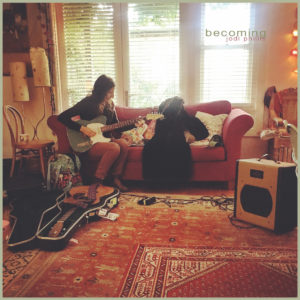
The album has this vintage feel about it – it feels warm, almost emanates a vibe from the sixties. There is a swirling giddiness on some tracks of the album. Was that a calculated thing?
It was calculated – because grief makes you wake up – ok, what do I want to spend time on my last years on this planet doing? So, it kinda made me wake up to the fact that when I was 14, I wanted to be a singer-songwriter. I was really listening to Joni Mitchell, Neil Young, Leonard Cohen, Cat Stevens, George Harrison – all those people, their lyrics were really deep. Especially with Leonard and Cat, they are really spiritual. I have always been a spiritual kind of person – not afraid of the word “God” or the word “soul”. I grew up in a pretty hippy family – my Mother was quite into yoga and spiritual stuff, and my Dad came from a long line of Church of England ministers. But we were never grown up religiously, which was great. But there was always a strong connection to the spirit inside everything – so that’s normal for me. But then, I felt like I have never done an album that expressed that part of me to the full. So, I harked back to those songwriters – I wanted to make that kind of record – and I am not into modern stuff. As handy as computers are…
Autotune!
Autotune, I can’t go there! The older I get I realise that I really love old stuff! Whether it is furniture, clothes, buildings – and the same with music – not that I don’t love some new music. But this album expresses the spiritual thing – I felt it was important to stay very organic.
Do you think that the future of the album is limited? Or are young people going to be track orientated via streaming?
Young people won’t know about this album unless they stumble upon it and someone plays it for them. I am not letting this album be streamed. I am only allowing two songs – the two singles to be streamed on Spotify, as I don’t want to give my music away, because I have to eat! And pay for my shelter! And bring up a child. So, I am really dealing with a whole other issue – it’s really hard to make a living from music, no matter how hard you work. Anyway, side-tracked! <laughs>
I played a house concert the other day, and a young couple sat at the front. And they were really, really listening. They must have been in their twenties. I was really intrigued why they were there – how they knew about it – me singing songs about my aged parents dying – I thought, what’s wrong with these people! <laughs> And at the end of the night, I asked anyone if they had any requests, and the young couple said, “Play the one about your Mother again”! – I was like, really? And I played that. And then they said, “Play the one about your Dad again”! And I did that one again. And at the end of the gig, I said wow glad you like the songs – and the guy said, “I want to go home and tell my mother that I love her – I feel like that song made me realise” – and that was young people. They have a heart, and they were getting it.
Life is transient and it goes so fast.
It is transient.
The feeling of transience is featured in ‘Vision of You’ [the song about Phillis’ father, Brian] – that moving feeling of a life unfurling.
He was constantly moving. He was pretty mad! I would love to make a documentary on his life. It would be really interesting.
The death of parents can make you aware of your own mortality. Are you scared of death?
No, not really. Most of the time, no. Tim and I talk about it, it’s like we’re ready to go! <laughs>
I meditate too, so that brings you to a place – of nothingness – where it is just spirit underneath everything. Whatever it is, it brings you to that – hints at the same place that might happen when you die. I find it really helpful. And grounding.
Phillis shares that she even sings at funerals now.
Jenny Briscoe is an amazing woman and she runs Tender Funerals. They did my Mother’s funeral. And that’s where I kind of became so comfortable with death. And I sing at funerals. They got a grant to pay for artists to be involved in the progressive funeral thing. Funeral parlours are like, you don’t want to know about them until you have to – it’s like how do you deal with these people? So weird and creepy! With Tender Funerals it’s community, not-for-profit, affordable and they do a custom thing for whatever the family wants, and whatever that means. And I just love the people that run it so much. And they started the Servo Food Truck [a music venue] in Port Kembla. We are all human, we are going to give you the best funeral no matter what. It is really beautiful.
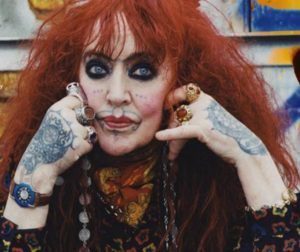
One of the songs on the album is about you being inspired by the late artist Vali Myers. What drew you to her?
I guess because I knew I was an artist from really a young age. And I knew I would never be able to do a conforming job. I always knew that. So, whenever I would hear something or see something from an authentic artist, I would be drawn to it. And she was one of the early ones. I saw her art in Melbourne , and I was just blown away from that point. And I also loved the way she looked. She looked like she was on her own trip! And I loved that. I wanted to be like that! She didn’t give a fuck about what people thought. She was so cool!
You shared at your gig last night that you sent the album to her long-time lover, Gianni Menichetti?
Yeah! My friend Lee, she does a lot of social media for me and The Clouds – and she secretly sent it to Gianni, or she secretly reached out to him and got his address, saying I know someone that has written a song about Vali. And he wrote back! And he said, yes please send it to me! He is a sweet man! And I sent it to him, and he finally received it. The Italian post is really bad! And he still lives in their house in the valley of Positano. No electricity. No running water. They live by candlelight. And I think he has a new lover now. And he loved it and wrote me a letter with beautiful words, thanking me for the song, and how he loves it and plays it everyday!
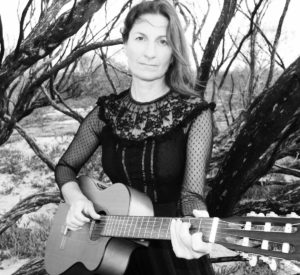
Phillis currently resides in Wollongong, but is pondering a move to Victoria or even to the south of France. I ask her if she could live in her Mother’s home country of the USA?
America is just too insane right now. I have a lot family there. I put my Dad’s ashes into the Hudson River. I have a strong pull to live there. And a real deep love for America. People that are creative, people that have creative and progressive minds are many, but there are many that aren’t. And it is a nightmare living there – everyone is depressed, deeply depressed. You can’t go to a café, because you have anxiety that a gunman is going to walk in. We can’t with any sanity of mind live there. And the abysmal health care and stuff. So, it’s really a sad time for Americans. It’s hard to believe that this is happening, you know? America is off the list!
Becoming was able to be made from support of Phillis’ fans through crowdfunding. She is grateful and overwhelmed by the support she received. The album was recorded at Jodi’s home in Wollongong, with her husband producing. Phillis has been driven in promoting the album with her limited budget and performing gigs throughout the country, as Jodi says “I am fucking exhausted“!
Before the album was released, Phillis went on a tour with Melbourne singer Rebecca Barnard.
You did shows with Rebecca Barnard last year?
Man, that was fun! It was like a blind date ‘cause we were working on this album, and I wanted to get out – because I haven’t been out as a solo artist for so long. So, it’s like, where do I start? I knew that drawing crowds would be hard on my own. People just think of me in The Clouds. It’s really hard to move pass that, even after I left The Clouds in 1997, people don’t let it go. Of course, we have since re-united. So, we were thinking, who could I do a little tour with, where we could both help each other. And Tim and I both went Rebecca Barnard! And we rang her up, and she was really keen. We probably met in the 90’s somewhere – but we had such a great time. We just laughed so much for four days straight. I mean, everyone loves Rebecca. But we also had a lot in common. Which was so weird! You know, losing our mothers, our fathers were both kooky, creative people. Her father played the drums on the Number 96 theme, and my father was the director of that show! We just had these great coincidences.
You are very driven in doing this yourself aren’t you?
Yes, but with Tim’s help. I couldn’t do it all myself. Tim has been helping me book gigs. He is a real helping person. A real natural cultivator of other people.
What is it like working with your husband in producing such a personal album?
We met through music, so we have a natural affinity, we understand each other completely. But we discuss a few things – he takes things very, very seriously. So, his role as producer is, “I am going to make this the best album, I can make” – so we had a few disagreements, but we got through it
We recorded this album in a studio in our house. We are pretty good at fooling people! We don’t have special gear, and don’t have an idea what we are doing technically. But Tim likes to work on something until it is right, until it moves you emotionally, which is really the genius thing.
Did you approach record companies with this album?
I don’t bother. I am just going to make my own way. If people catch on that is great.
Are there benefits with being with a record company or more cons?
You definitely get more exposure. That is the only thing it is good for. And a recording, marketing and touring budget. With small labels, they often don’t even send you statements. I find it difficult dealing with the business people of music.
Weren’t The Clouds dropped by a record company in the nineties?
Yeah, The Clouds were dropped by Elektra. You know, it’s just business. I am not really good at talking business. Dealing with business people. They don’t go together. I long for a person that will help me manage all my shit! I would love to pay them and help me with all the stuff. But it hasn’t happened yet.
The Clouds had an extensive touring schedule. Was that hard?
I suffer really bad insomnia. There was a lot of fun times but I didn’t find the touring with a band really easy. It was really hard, hard with people with different personalities. It was like being married to three people! I am a pretty neurotic person, pretty sensitive, I find it really difficult dealing with everyone’s strong personalities. I find that really hard. I try! I tried really hard!
Another major change in Jodi’s life, as she revealed to me at the gig (where I was holding a Mythos beer at the time) was that she stopped drinking alcohol.
That has helped with everything. It’s great! We were in with this big bunch of friends where we live – and every couple of weekends we would get together and get smashed and dance on the tables, it was fun, like a real fun ten years – and I was really enjoying Tequila, and with Tequila I would turn into this crazy Wollongong woman called Janelle! An alter ego called Janelle! And that was fun for about ten years, but after I went through menopause and my Mother died – when I would have a drink, I would get angry!
Angry Janelle!
Angry Janelle that wanted to rip apart any man that came near me! “What the fuck are you are looking at?!!” So, I stopped drinking – but I have never really been a big drinker!
Except for ten years!
Yes, except for ten years! I didn’t even have to try to stop – I just couldn’t go near the stuff! It’s been really good, because Tim stopped as well, and it has really been great for the both of us. We are so much more with it. Hangovers suck!
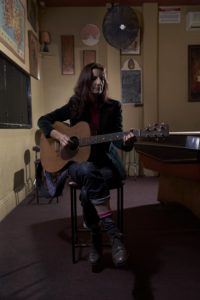
Phillis like many artists of her generation find it hard to get exposure for their new work. Even though they are producing their best work, it seems that ageism or commercialism could be at play. Even the ABC stalwart Rage would not play her videos. Her latest single ‘Hudson Dreaming’ is an evocative, beautiful song with a dreamy clip – even though Rage plays The Clouds work from 27 years ago, they seemingly don’t support seasoned Australian artists on their musical journey framed as contemporary artists.
<JP> Rage – came back with this response, saying that sorry it didn’t make the cut. And I wrote back and asked why – and they wrote that they have these guidelines about how they don’t want performance clips, which mine aren’t strictly anyway – we want boundary pushing clips that are artistic. It took me a while to work out what to write back – I said something like, “where is the support for older artists? You play The Clouds several times a year, I would have thought your audience might be interested in what the founding member of the fucking Clouds is doing”. It was a bit more polite than that. Also in the policy of what they want on Rage there was nothing about the music. It doesn’t seem to matter if a song is good, there is nothing about the quality of the music in the Rage guidelines. It was really upsetting, and it still is. I understand that Rage are promoting the art of video making and I get that and I know they are inundated with new clips everyday…but there is no other TV show filling the void. Something like Later….with Jools Holland. We NEEEED that in Australia! Let’s move on from the fucking 90’s!
Nostalgia in music seems to be on the rise.
For instance, I love The Pixies. I love their old stuff but I am not connected to the nostalgia side of it. I will listen to anything that Frank Black does. Teenager of the Year is one of my favourite albums. I don’t know why people have that mindset. As an artist gets older they gain life experience. It makes sense to me if you are a real true fan, you would keep on listening, and see how the artist has evolved.
After producing a career highlight album, what is next? Another solo album?
Yes. Absolutely! After this I start composing a piece for a dance theatre in Parramatta – with Amanda Brown [ex-member of the band The Go-Betweens and an established musician in her own right] – and that is an hour long show for a 50 piece orchestra – the Western Sydney Youth Orchestra. So that will keep me busy. In the meantime, I am going to go out and do more shows in February and March. Try and have a holiday in May. And then I will start writing for the next album. I really want to go to Europe and the US. Just by myself.
After the interview ends, Phillis and I hug, and I leave feeling that I have met a thoughtful, considered and intelligent woman. This singer-songwriter has really produced an intimate piece of work, imbued with a strong feminine energy that gives us a lesson in how to deal with grief, but also how to liberate yourself and be true. Even though being a musician is hard work, and has limited financial returns, Phillis sums it up well, with an email she sent me after the interview – the following being a succinct summation of where she is at – “even with all the obvious challenges we artists face, I wouldn’t trade my work for any money in the world. Singing and writing music keeps me happy and healthy. I feel lucky to do this. Everything falls into place if I stick to my path”.
All I can say in conclusion is to listen and feel Becoming. Albums dripping with such sincere honesty are a rare find.
Website: http://www.rogerlovesbetty.com





